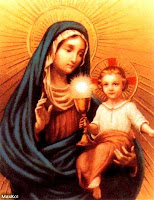Think Heaven Is A Certain Destination For Your Soul?
We must never presume upon God's mercy. Too many of us take His mercy for granted. We do not like to think of His justice. Why Catholics are being told they all have a reasonable hope of being saved.
This is not quite what many of our Saints have concluded.
 |
| (Image Source: cathopic.com) |
Here are two short examples:
- According to St. Leonard of Port Maurice, Saint Vincent Ferrer reported "that an archdeacon in Lyons gave up his charge and retreated into a desert place to do penance, and that he died the same day and hour as Saint Bernard. After his death, he appeared to his bishop and said to him, ‘Know, Monsignor, that at the very hour I passed away, thirty-three thousand people also died. Out of this number, Bernard and myself went up to heaven without delay, three went to purgatory, and all the others fell into Hell.' "
- Saint Jacinta of Fatima warned that “So many people are going to die, and almost all of them are going to Hell! So many people falling into hell!”
If this is not enough for us to abandon any sense of spiritual complacency we may have adopted and begin anticipatory trembling, ponder this example Venerable Louis of Granada, O.P. shared in his spiritual classic, The Sinner's Guide:
"Ask the saints, and they will tell you, more by their actions than by their words, how terrible is the account we are to render to God…
St. John Climacus gives an example of a holy monk, which is so remarkable that I shall give it as nearly as possible in the saint's own words: 'A religious named Stephen, who lived in the same desert with us, had a great desire to embrace a more solitary life. He had already acquired a reputation for sanctity, having been favored with the gift of tears and fasting and other privileges attached to the most eminent virtues. Having obtained his superior's permission, he built a cell at the foot of Mount Sinai, where Elijah was honored by his marvelous vision of God. Though his life here was one of great sanctity, yet, impelled by desire for still harder labors and greater perfection, he withdrew to a place called Sidon, inhabited by holy anchorites who lived in the most complete solitude. Here he continued for some years in the practice of the severest penance, cut off from all human intercourse or comfort, for his hermitage was seventy miles from any human habitation. As his life approached its term he felt a desire to return to his first cell at the foot of Mount Sinai, where dwelt two disciples, natives of Palestine. Shortly after his arrival he was attacked by a fatal illness. The day before his death he fell into a state resembling ecstasy. He gazed first at one side of his bed, then at the other, and, as if engaged in conversation with invisible beings who were demanding an account of his life, was heard crying out in a loud voice. Sometimes he would say, 'It is true, I confess it; but I have fasted many years in expiation of that sin'; or, 'It is false; that offense cannot be laid to my charge'; or again, 'Yes, but I have labored for the good of my neighbor so many years in atonement thereof.' To other accusations he was heard to say, 'Alas! I cannot deny it; I can only cast myself upon God's mercy.'
"Surely this was a thrilling spectacle," continues the saint. "I cannot describe the terror with which we assisted at this invisible judgment. O my God! What will be my fate, if this faithful servant, whose life was one long penance, knew not how to answer some of the accusations brought against him? If after forty years of retirement and solitude, if after having received the gift of tears, and such command over nature that, as I am credibly informed, he fed with his own hand a wild leopard which visited him, the saintly monk so trembled for judgment, and, dying, left us in uncertainty as to his fate, what have we not to fear who lead careless and indifferent lives?"
I can already hear the criticism: Why dwell on this subject area and make so many feel uncomfortable? What good do you accomplish by doing so? My response - in hopes of saving a soul, my own as well!
I agree, it would be far better for us to live our lives in conformity to God's commands out of sheer love of Him rather than out of fear of eternal punishment or in hope of an eternal reward. But is that a reasonable expectation? Apparently not to St. Francis and our holy Father St. Dominic, who according to Louis of Granada, O.P.:
"…commanded in their rules the preachers of their orders to make vice and virtue, reward and punishment, the only subjects of their sermons… it is a common principle among philosophers that reward and punishment are the most powerful motives for good with the mass of mankind. Such, alas, is our misery, that we are not content with virtue alone; it must be accompanied with the fear of punishment or the hope of reward…"
I do not think human nature has changed much since these two preachers walked this earth. I can not speak for you, but I and many souls I know, would eternally benefit if vice and virtue, reward and punishment, were the subject of at least a few homilies?
What are your thoughts?

.jpg)

Comments